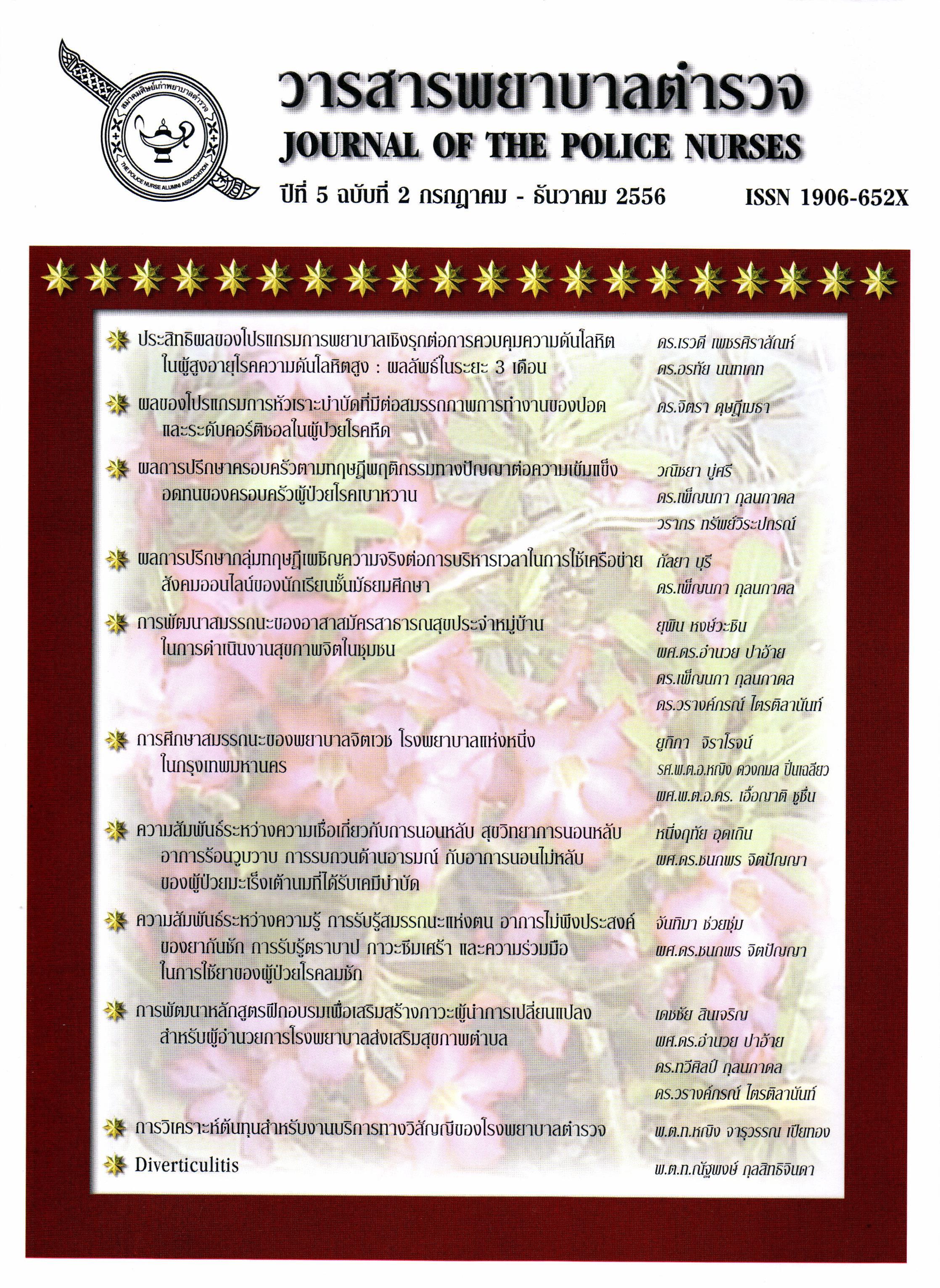ประสิทธิผลของโปรแกรมการพยาบาลเชิงรุกต่อการควบคุมความดันโลหิตในผู้สูงอายุโรคความดันโลหิตสูง: ผลลัพธ์ในระยะ 3 เดือน
Keywords:
ผู้สูงอายุ, การพยาบาลเชิงรุก, รูปแบบการดูแลผู้ป่วยเรื้อรัง, ความดันโลหิตสูง, older adult, proactive nursing, Chronic Care Model, hypertensionAbstract
บทคัดย่อ
การศึกษาครั้งนี้เป็นการวิจัยแบบกึ่งทดลอง (Quasi-experimental study) มีวัตถุประสงค์เพื่อศึกษาประสิทธิภาพของโปรแกรมการพยาบาลเชิงรุกในผู้สูงอายุโรคความดันโลหิตสูงต่อการควบคุมความดันโลหิต การพัฒนาโปรแกรมระยะ 3 เดือนจากการทบทวนวรรณกรรมร่วมกับประยุกต์ใช้กรอบแนวคิดของรูปแบบการดูแลผู้ป่วยเรื้อรังของ Wagner (1998) และนำไปใช้ที่ โรงพยาบาลส่งเสริมสุขภาพตำบล 5 แห่งในจังหวัดนครศรีธรรมราช กลุ่มตัวอย่างเป็นผู้สูงอายุโรคความดันโลหิตสูง อายุ 60-79 ปี จำนวน 100 คนและแบ่งกลุ่มที่ได้รับการดูแลตามปกติ และกลุ่มทดลองได้รับการดูแลตามปกติร่วมกับโปรแกรมการพยาบาลเชิงรุกจำนวนเท่ากัน ซึ่งโปรแกรมการพยาบาลเชิงรุก ได้แก่ การให้ความรู้ การพัฒนาทักษะปฏิบัติพฤติกรรมสุขภาพ และการติดตามพฤติกรรมสุขภาพ การเปรียบเทียบความแตกต่างของค่าเฉลี่ยความดันโลหิตขณะหัวใจบีบตัว และ ความดันโลหิตขณะหัวใจคลายตัว ก่อนและหลังการให้โปรแกรมระหว่างกลุ่มทดลองและกลุ่มเปรียบเทียบโดยใช้สถิติ independence t-test และการเปรียบเทียบความแตกต่างของสัดส่วนการควบคุมความดันโลหิตได้ตามเกณฑ์ระหว่างทั้งสองกลุ่ม ใช้สถิติ Chi-square test
ผลการวิจัยสรุปได้ว่า
- ผู้สูงอายุกลุ่มที่ได้รับโปรแกรมการพยาบาลเชิงรุกมีค่าเฉลี่ยของความดันโลหิตขณะหัวใจบีบตัวและความดันโลหิตขณะหัวใจคลายตัวภายหลังการทดลอง 3 เดือน ต่ำกว่ากลุ่มที่ได้รับการดูแลตามปกติ แต่ไม่มีความแตกต่างระหว่างทั้งสองกลุ่มอย่างมีนัยสำคัญทางสถิติ (p > 0.05)
- สัดส่วนของผู้สูงอายุในกลุ่มที่ได้รับโปรแกรมการพยาบาลเชิงรุกสามารถควบคุมความดันโลหิตได้ตามเกณฑ์สูงกว่าผู้สูงอายุในกลุ่มที่ได้รับการดูแลตามปกติ ภายหลังการทดลอง 3 เดือน แตกต่างกันอย่างมีนัยสำคัญทางสถิติ (p < 0.05)
ดังนั้นควรนำโปรแกรมการพยาบาลเชิงรุกไปใช้ในโรงพยาบาลส่งเสริมสุขภาพระดับตำบลเพื่อเพิ่มการควบคุมความดันโลหิตในผู้สูงอายุที่ควบคุมความดันโลหิตไม่ได้
คำสำคัญ: ผู้สูงอายุ การพยาบาลเชิงรุก รูปแบบการดูแลผู้ป่วยเรื้อรัง ความดันโลหิตสูง
THE EFFECTIVENESS OF A PROACTIVE NURSING PROGRAM ON BLOOD PRESSURE CONTROL IN OLDER ADULTS WITH HYPERTENSION: 3-MONTH OUTCOME
Abstract
This quasi-experiment with control group, pretest-posttest design was aimed to evaluate the effects of a proactive nursing program (PNP) on blood pressure control of hypertensive older adults. The 3-month PNP based on the Chronic Care Model (Wagner, 1998), was developed by literature review and implemented at five Tambon Health Promotion Hospitals in Nakhon Si Thammarat, Thailand. A hundred eligible participants who had age between 60 – 79 years old were studied and divided to the experimental group or comparison group equally. The intervention consisted of education, health skill training, and health skill monitoring. The means of systolic blood pressure and diastolic blood pressure before and after implementing PNP between the intervention group and comparison group were compared the difference by using independent t-test. The proportion of blood pressure control between group were compared the difference by Chi-square test.
The major findings were as followed:
- The participants in the experimental group had lower means blood pressure at three months. Post-test means of blood pressure were no significantly lower in the experimental group (p > 0.05).
- The percentage of participants maintaining blood pressure control was also significantly greater in the intervention group at 3rd month (p < 0.05).
These results suggest that implementing this PNP at Tambon Health Promotion Hospitals would result in better control of hypertension in this high risk group.
Keywords : older adult, proactive nursing, Chronic Care Model, hypertension
Downloads
Downloads
How to Cite
Issue
Section
License
ผลงานที่ได้ตีพิมพ์แล้วจะเป็นลิขสิทธิ์ของวารสารพยาบาลตำรวจ















